最新小学人教版五年级英语下册单词及常用句型
人教版五年级的下册的英语重要单词和句型.doc

Unit1 This is My Day一、重点单词:do morning exercises eat breakfast have English class play sportseat dinner when evening usually noon weekend go shopping play the piano sometimesget up atoften climb mountains visit grandparents go hiking二、重点句型:1. —— When do you do morning exercises?—— I usually do morning exercises at 8:30.2. —— When do you eat lunch?—— I eat lunch at noon.。
3.—— What do you do on the weekend?—— What do you do on weekends?4. —— I can't go to play football in the rain. I can’ t go hiking ,either .Unit 2 My Favourite Season一、单词:spring summer fall winter season which best swim fly kitesskate make a snowman plant trees why becausesleepplay with always leaf( 复数 leaves) snow up north二、句子1. 一 What's your favourite season?一Winter.2. — Which season do you like best? ---- I like summer best.3. —— Why do you like summer?——Because l can swim in the lake —— Why do you like winter?——Because l can sleep a long time ..Unit 3 My Birthday一、单词:January(Jan. )February(Feb.) March(Mar.)April(August( Aug.)September(Sept.)October(Oct.)November(Nov.) December (Dec.) first second thirdfourth fifth eighth ninth twelfth twentiethbirthday uncle her dateApr.)二、句型:1. When is your birthday? 一 My birthday is in June .2. How many birthdays are there in January? —— There are ⋯3. Is your birthday in February , too? —— Yes, it is.4. Who has a birthday in October?5. What's the date today? —— It ’ April 14 th .Unit 4 What are you doing?一、单词: draw pictures cook inner read books answer the phonelisten to music clean the room write a letter write an E-mail grandpa study talk Children's Center see you laterspeak to hold on call二、句型1. W hat are you doing? 一 I am doing the dishes .2. This is Chen Jie =It ’s Chen Jie.3. What is your father doing? 一 He's writing an e-mail in the study .4. C an l speak to your mom , please?5. P lease hold on .6. T here is a call for you .7. G randpa is writing a letter .Brother is doing homework .Mom is cooking dinner in the kitchen .Unit 5 Look at the Monkeys一、单词 fly jump walk run swim kangaroo sleepclimb fight swing drink water trunk climber二、句型1. Look at the tiger .2. I see the mother elephant .3. Do you see any elephants?4. What is it doing? —— It ’ s walking.5. What are they doing? 一 They are drinking water.Unit 6 A Field Trip一、单词: take pictures watch insects pick up leaves do anexperiment catch butterflies count insects collect leaves write a report play chess have a picnic honeyhave a look woods ant interesting thing himleave us over there1. What is he doing? 一 He's watching insects .2. Are they catching butterflies? —— Yes, they are .∕ No,they aren't .3. Are you eating lunch? Yes , we are .No, we aren't .4. What experiment? 一 What do ants like to eat?5. Is he taking pictures? —— Yes,he is .∕ No, he isn't .6. 一 Is she counting insects?——Yes,she is.∕ No,she isn’ t.。
人教版五年级英语下册重点句型及语法

人教版五年级英语下册重点句型及语法第一单元1、其他日常活动:eat breakfast 吃早饭 eat lunch吃午饭 eat dinner 吃晚饭get up起床 go to bed 上床睡觉 wash my clothes 洗我的衣服watch TV看电视 go swimming 去游泳 go running去跑步do homework 做作业 do kungfu练武术 play ping-pong打乒乓球play football踢足球 play basketball打篮球 play the pipa弹琵琶play music 演奏音乐 finish class 结束上课 start class 开始上课in the water/sea 在水里/在海里 is good at 擅长 get off 逃脱 lots of 许多2、频度副词。
always总是,一直(100%)usually通常(80%) often 经常(60%)sometimes(30%)有时3、疑问词。
when什么时候 why 为什么 what 什么重点句型。
1、询问别人什么时候做某事的句型及回答。
句型结构:问:When do you+动词短语原形+其他?(你/你们什么时候做某事?)答:I/we(+频度副词)+动词短语原形+at+具体时间(我/我们通常在几点做某事。
)例:问:When do you go to bed?(你什么时候上床睡觉?)答:I go to bed at 9:00p.m (我晚上9点上床睡觉。
)注意:当主语是第三人称单数(he,she,it,单个人名或单数名词)时,助动词do要变成doe s,句型结构是:when does+主语(第三人称单数)+动词短语原形+其他?2、询问别人周末做什么的句型及回答。
句型结构:问:What do you do on the weekend?(你周末做什么?)答:I(+频度副词)+动词(短语)+其他。
人教版小学五年级下册英语知识点整理
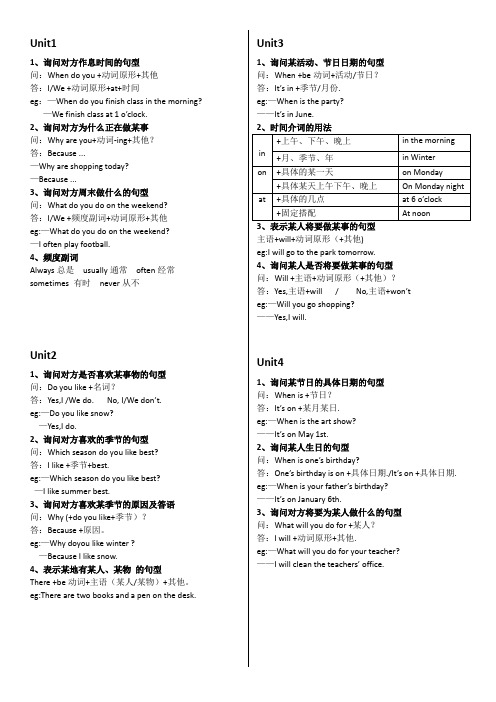
Unit11、询问对方作息时间的句型问:When do you +动词原形+其他答:I/We +动词原形+at+时间eg:—When do you finish class in the morning?—We finish class at 1 o’clock.2、询问对方为什么正在做某事问:Why are you+动词-ing+其他?答:Because ...—Why are shopping today?—Because ...3、询问对方周末做什么的句型问:What do you do on the weekend?答:I/We +频度副词+动词原形+其他eg:—What do you do on the weekend?—I often play football.4、频度副词Always总是usually通常often经常sometimes 有时never从不Unit21、询问对方是否喜欢某事物的句型问:Do you like +名词?答:Yes,I /We do. No, I/We don’t. eg:—Do you like snow?—Yes,I do.2、询问对方喜欢的季节的句型问:Which season do you like best?答:I like +季节+best.eg:—Which season do you like best?—I like summer best.3、询问对方喜欢某季节的原因及答语问:Why (+do you like+季节)?答:Because +原因。
eg:—Why doyou like winter ?—Because I like snow.4、表示某地有某人、某物的句型There +be动词+主语(某人/某物)+其他。
eg:There are two books and a pen on the desk.Unit31、询问某活动、节日日期的句型问:When +be动词+活动/节日?答:It’s in +季节/月份.eg:—When is the party?——It’s in June.主语+will+动词原形(+其他)eg:I will go to the park tomorrow.4、询问某人是否将要做某事的句型问:Will +主语+动词原形(+其他)?答:Yes,主语+will / No,主语+won’t eg:—Will you go shopping?——Yes,I will.Unit41、询问某节日的具体日期的句型问:When is +节日?答:It’s on +某月某日.eg:—When is the art show?——It’s on May 1st.2、询问某人生日的句型问:When is one’s birthday?答:One’s birthday is on +具体日期./It’s on +具体日期. eg:—When is your father’s birthday?——It’s on January 6th.3、询问对方将要为某人做什么的句型问:What will you do for +某人?答:I will +动词原形+其他.eg:—What will you do for your teacher?——I will clean the teachers’ office.1、描述物品归属的句型物品+ be动词(is/are)+(mine/his/hers/yours/ours/theirs) eg:The book is yours.2、确认物品归属地句型问:be动词+this/that/these/those(+其他)+某人的?答:Yes,it is. Yes,they are./ No,it,is’t. No,they aren’t. eg:—Is that crayou his?——Yes,it is.3、询问物品归属的句型问:单数Whose+is it/this/that?复数Whose+are they/these/those?答:It’s/They’re+名词性物主代词/ 名词所有格eg:—Whose bag is this?——It’s mine.4、现在进行时的一般疑问句问:Be动词+主语+动词-ing(+其他)?答:Yes,主语+be动词/ No,主语+be动词+not. eg:—Is she listening to music?——Yes,she is.5、描述某人正在做某事主语+be动词(am/is/are)+动词-ing(+其他).eg:I’m doing my homework now.6、询问某人能否做某事问:Can+主语+动词原形+其他?答:Yes,主语+can. /No,主语+can’t.eg:—Can I play football?——Yes,you can.Unit61、询问多个人或动物正在做什么的句型问:What are +主语(复数)+doing?答:主语(复数)+are+动词-ing+其他.eg:—What are the boys doing?——They are jumping2、询问单个人或动物正在做什么的句型问:What is +主语(单数)+doing?答:主语(单数)+is+动词-ing+其他.eg:—What is Tom doing?——He is playing football.。
人教版PEP五年级下册英语全册重点句型
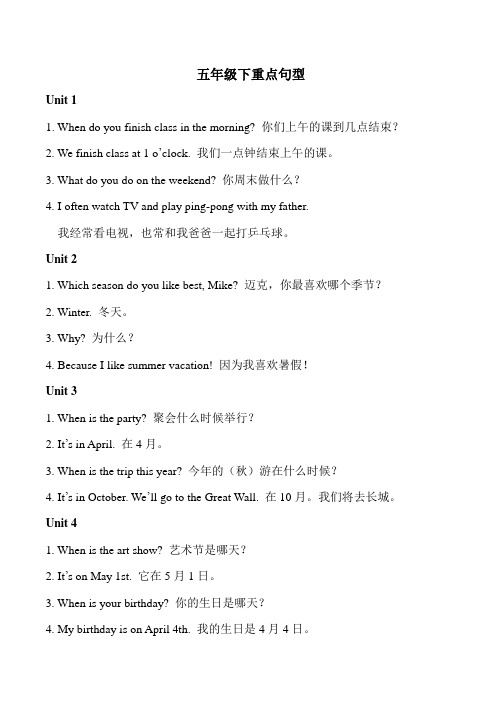
五年级下重点句型Unit 11. When do you finish class in the morning? 你们上午的课到几点结束?2. We finish class at 1 o’clock. 我们一点钟结束上午的课。
3. What do you do on the weekend? 你周末做什么?4. I often watch TV and play ping-pong with my father.我经常看电视,也常和我爸爸一起打乒乓球。
Unit 21. Which season do you like best, Mike? 迈克,你最喜欢哪个季节?2. Winter. 冬天。
3. Why? 为什么?4. Because I like summer vacation! 因为我喜欢暑假!Unit 31. When is the party? 聚会什么时候举行?2. It’s in April. 在4月。
3. When is the trip this year? 今年的(秋)游在什么时候?4. It’s in October. We’ll go to the Great Wall. 在10月。
我们将去长城。
Unit 41. When is the art show? 艺术节是哪天?2. It’s on May 1st. 它在5月1日。
3. When is your birthday? 你的生日是哪天?4. My birthday is on April 4th. 我的生日是4月4日。
Unit 51. The yellow picture is mine. 那幅黄颜色的画是我的。
2. Are these all ours? 这些都是我们的画吗?3. Whose is it? 这是谁的?4. It’s Zhang Peng’s. 是张鹏的。
5. Is he drinking water? 他在喝水吗?6. No, he isn’t. He’s eating. 不是。
五年级下册的所有英语单词
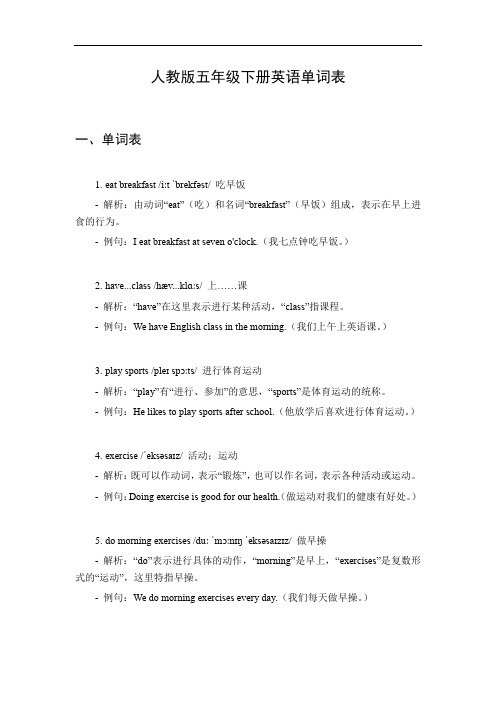
人教版五年级下册英语单词表一、单词表1.eat breakfast /iːt ˈbrekfəst/ 吃早饭-解析:由动词“eat”(吃)和名词“breakfast”(早饭)组成,表示在早上进食的行为。
-例句:I eat breakfast at seven o'clock.(我七点钟吃早饭。
)2.have...class /hæv...klɑːs/ 上……课-解析:“have”在这里表示进行某种活动,“class”指课程。
-例句:We have English class in the morning.(我们上午上英语课。
)3.play sports /pleɪ spɔːts/ 进行体育运动-解析:“play”有“进行、参加”的意思,“sports”是体育运动的统称。
-例句:He likes to play sports after school.(他放学后喜欢进行体育运动。
)4.exercise /ˈeksəsaɪz/ 活动;运动-解析:既可以作动词,表示“锻炼”,也可以作名词,表示各种活动或运动。
-例句:Doing exercise is good for our health.(做运动对我们的健康有好处。
)5.do morning exercises /duː ˈmɔːnɪŋ ˈeksəsaɪzɪz/ 做早操-解析:“do”表示进行具体的动作,“morning”是早上,“exercises”是复数形式的“运动”,这里特指早操。
-例句:We do morning exercises every day.(我们每天做早操。
)6.eat dinner /iːt ˈdɪnə(r)/ 吃晚饭-解析:与“eat breakfast”类似,“dinner”是晚饭。
-例句:They eat dinner at six in the evening.(他们晚上六点吃晚饭。
)7.clean my room /kliːn maɪ ruːm/ 打扫我的房间-解析:“clean”是打扫、清洁的意思,“my room”我的房间。
(完整版)小学五年级英语下册重点句型及短语汇总
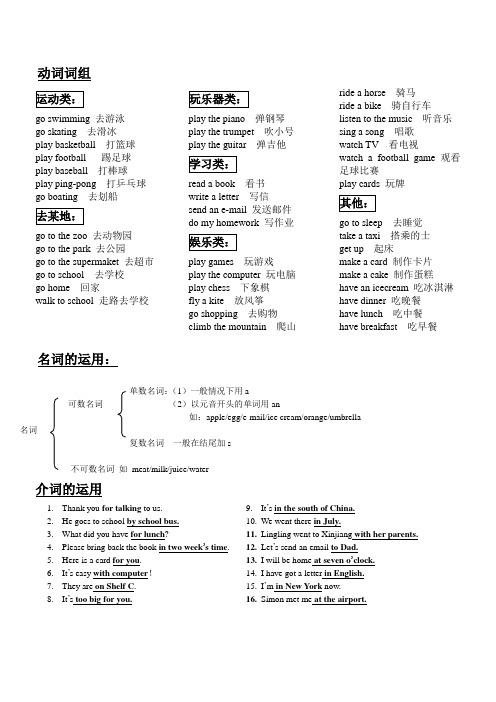
动词词组go swimming 去游泳go skating 去滑冰play basketball 打篮球play football 踢足球play baseball 打棒球play ping-pong 打乒乓球go boating 去划船go to the zoo 去动物园go to the park 去公园go to the supermaket 去超市go to school 去学校go home 回家walk to school 走路去学校play the piano 弹钢琴play the trumpet 吹小号play the guitar 弹吉他read a book 看书write a letter 写信send an e-mail 发送邮件do my homework 写作业play games 玩游戏play the computer 玩电脑play chess 下象棋fly a kite 放风筝go shopping 去购物climb the mountain 爬山ride a horse 骑马ride a bike 骑自行车listen to the music 听音乐sing a song 唱歌watch TV 看电视watch a football game 观看足球比赛play cards 玩牌go to sleep 去睡觉take a taxi 搭乘的士get up 起床make a card 制作卡片make a cake 制作蛋糕have an icecream 吃冰淇淋have dinner 吃晚餐have lunch 吃中餐have breakfast 吃早餐名词的运用:单数名词:(1)一般情况下用a可数名词(2)以元音开头的单词用an如:apple/egg/e-mail/ice cream/orange/umbrella 名词复数名词一般在结尾加s不可数名词如meat/milk/juice/water介词的运用1.Thank you for talking to us.2.He goes to school by school bus.3.What did you have for lunch?4.Please bring back the book in two week’s time.5.Here is a card for you.6.It’s easy with computer!7.They are on Shelf C.8.It’s too big for you.9.It’s in the south of China.10.We went there in July.11.Lingling went to Xinjiang with her parents.12.Let’s send an email to Dad.13.I will be home at seven o’clock.14.I have got a letter in English.15.I’m in New York now.16.Simon met me at the airport.一般过去时:表示过去某个时间里发生的动作或状态。
新人教版PEP 【小学五年级英语下册】 单元知识点 归纳总结

新人教版PEP 【小学五年级英语下册】单元知识点归纳总结Unit 1 My DayIn this unit。
we learn some core vocabulary words。
phrases。
and XXX.Core Vocabulary:1.Verbs: take (studying)。
go to (class)2.Nouns: dancing。
exercise。
sports3.Phrases: do morning exercises。
eat breakfast。
play sports。
eat dinner。
go for a walk。
go shopping。
clean my room。
take a dancing class。
have a classXXX Vocabulary:1.Verbs: start。
shop。
work。
need。
live。
win。
sound2.Nouns: Spain。
play。
letter。
island。
cave3.ns: after4.XXX: when。
XXX。
a.m。
p.m。
why。
last。
also。
busy5.nal Vocabulary: frequency adverbs (always。
usually。
sometimes)Phrases:watch TV。
eat lunch。
go to bed。
go swimming。
go home。
go to schoolCore Sentence Structure:When do you do morning exercises?" "At 7 o'clock."XXX phrase is "good job" to praise XXX.Which season do you like best。
I like winter best。
This sentence means "which one do you like the most" and "like。
小学五年级下册英语单词及句型【五篇】
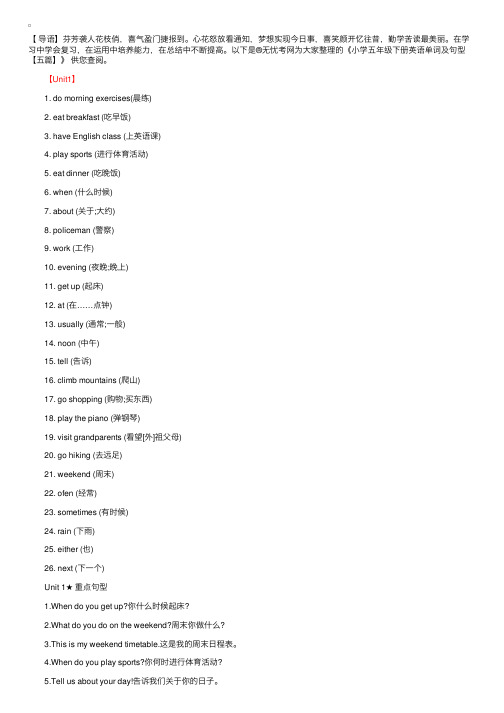
【导语】芬芳袭⼈花枝俏,喜⽓盈门捷报到。
⼼花怒放看通知,梦想实现今⽇事,喜笑颜开忆往昔,勤学苦读最美丽。
在学习中学会复习,在运⽤中培养能⼒,在总结中不断提⾼。
以下是®⽆忧考⽹为⼤家整理的《⼩学五年级下册英语单词及句型【五篇】》供您查阅。
【Unit1】1. do morning exercises(晨练) 2. eat breakfast (吃早饭) 3. have English class (上英语课) 4. play sports (进⾏体育活动) 5. eat dinner (吃晚饭) 6. when (什么时候) 7. about (关于;⼤约) 8. policeman (警察) 9. work (⼯作) 10. evening (夜晚;晚上) 11. get up (起床) 12. at (在……点钟) 13. usually (通常;⼀般) 14. noon (中午) 15. tell (告诉) 16. climb mountains (爬⼭) 17. go shopping (购物;买东西) 18. play the piano (弹钢琴) 19. visit grandparents (看望[外]祖⽗母) 20. go hiking (去远⾜) 21. weekend (周末) 22. ofen (经常) 23. sometimes (有时候) 24. rain (下⾬) 25. either (也) 26. next (下⼀个) Unit 1★重点句型 1.When do you get up?你什么时候起床? 2.What do you do on the weekend?周末你做什么? 3.This is my weekend timetable.这是我的周末⽇程表。
4.When do you play sports?你何时进⾏体育活动? 5.Tell us about your day!告诉我们关于你的⽇⼦。
(完整版)新人教版五年级英语下册单词表
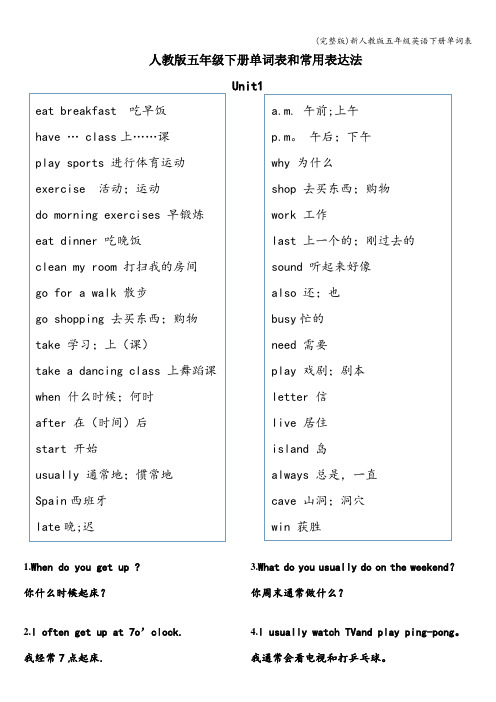
人教版五年级下册单词表和常用表达法Unit11.When do you get up ?你什么时候起床?2.I often get up at 7o’clock.我经常7点起床.3.What do you usually do on the weekend?你周末通常做什么?4.I usually watch TVand play ping-pong。
我通常会看电视和打乒乓球。
eat breakfast 吃早饭have … class上……课play sports 进行体育运动exercise 活动;运动do morning exercises 早锻炼eat dinner 吃晚饭clean my room 打扫我的房间go for a walk 散步go shopping 去买东西;购物take 学习;上(课)take a dancing class 上舞蹈课when 什么时候;何时after 在(时间)后start 开始usually 通常地;惯常地Spain西班牙late晚;迟a.m. 午前;上午p.m。
午后;下午why 为什么shop 去买东西;购物work 工作last 上一个的;刚过去的sound 听起来好像also 还;也busy忙的need 需要play 戏剧;剧本letter 信live 居住island 岛always 总是,一直cave 山洞;洞穴win 获胜Unit21.Which season do you like best?你最喜欢哪一个季节?2.Autumn./I like autumn best.秋天。
/我最喜欢秋天。
3.What do you often do in summer?你在夏天经常做什么?4.I often go swimming。
我经常去游泳spring 春天summer 夏天autumn 秋天winter 冬天season 季节picnic 野餐go on a picnic 去野餐pick 摘;采集pick apples 摘苹果snowman 雪人make a snowman 堆雪人which 哪一个best 最好地snow 雪good job做得好because 因为vacation 假期all 全,完全pink 粉色;粉色的lovely 可爱的;美丽的leaf 叶子fall 落下;【美】秋天paint 用颜料绘画,日常安排Unit31.When is Tree Planting Day?什么时候是植树节?2.It's in March.它在三月。
【口袋书】人教版PEP五年级下册英语 基础知识汇总

人教版PEP五年级下册基础知识汇总Unit 1 My day.重点单词:[四会]dancing 跳舞;舞蹈exercise 活动;运动take 学习;上(课)[三会]after 在(时间)后start 开始usually 通常地;惯常地Spain 西班牙late 晚;迟a.m.午前;上午p.m.午后;下午why 为什么shop 去买东西;购物work 工作last 上一个的;刚过去的sound 听起来好像also 还;也busy 忙的need 需要play 戏剧;剧本letter 信live 居住island 岛always 总是;一直cave 山洞;洞穴win 获胜重点短语:eat breakfast 吃早饭have … class 上…课play sports 进行体育运动do morning exercises 做早操eat dinner 吃晚饭clean my room 打扫我的房间go for a walk 散步go shopping 去买东西;购物take a dancing class 上舞蹈课go swimming 去游泳start class 开始上课last night 昨天晚上after lunch 午饭以后a lot of fun 许多乐趣live on an island 住在一座岛上be good at sports 擅长体育运动字母组合cl 发/kl/ 音:clean 打扫clock 钟class 课;班级clever 聪明的clock 钟字母组合pl 发/pl/ 音:plate 盘子;碟子eggplant 茄子please 请play 玩耍;戏剧重点句型:1.询问别人什么时候做某事的问句及回答:-- When do/does + 主语+ 动词(短语)原形(+ 其他)?-- 主语(+ 频度副词)+ 动词(短语)原形/ 第三人稀单数形式+ at + 具体时间/ At + 具体时间.-- When do you get up? 你什么时候起床?-- I get up at 5 o'clock. 我5点起床。
五年级英语下册单词表完整版

五年级英语下册单词表完整版人教版五年级英语下册单词表。
Unit 1.1. eat breakfast [iːt ˈbrekfəst]:动宾短语,吃早饭。
2. have…class [hæv klɑːs]:动宾短语,上……课。
3. play sports [pleɪ spɔːts]:动宾短语,进行体育运动。
4. exercise [ˈeksəsaɪz]:n. 活动;运动;练习;v. 锻炼。
5. do morning exercises [duːˈmɔːnɪŋˈeksəsaɪzɪz]:做早操。
6. eat dinner [iːt ˈdɪnə(r)]:吃晚饭。
7. clean my room [kliːn maɪ ruːm]:打扫我的房间。
8. go for a walk [ɡəʊ fɔː(r) ə wɔːk]:散步。
9. go shopping [ɡəʊˈʃɒpɪŋ]:去买东西;购物。
10. take [teɪk]:v. 拿;取;学习;花费(时间)11. take a dancing class [teɪk əˈdɑːnsɪŋ klɑːs]:上舞蹈课。
12. when [wen]:adv. 什么时候;何时。
13. after [ˈɑːftə(r)]:prep. & conj. 在(时间)后。
14. start [stɑːt]:v. 开始。
15. usually [ˈjuːʒuəli]:adv. 通常地;惯常地。
16. Spain [speɪn]:n. 西班牙。
17. late [leɪt]:adj. 晚;迟。
Unit 2.1. spring [sprɪŋ]:n. 春天。
2. summer [ˈsʌmə(r)]:n. 夏天。
3. fall [fɔːl]:n. 秋天;落下;跌倒(美语,fall = 英式英语的autumn)4. winter [ˈwɪntə(r)]:n. 冬天。
5. season [ˈsiːzn]:n. 季节。
五年级下册人教版英语书单词表
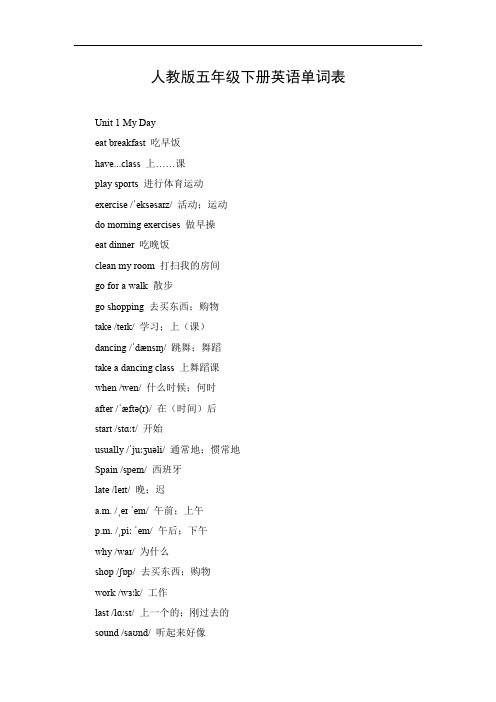
人教版五年级下册英语单词表Unit 1 My Dayeat breakfast 吃早饭have...class 上……课play sports 进行体育运动exercise /ˈeksəsaɪz/ 活动;运动do morning exercises 做早操eat dinner 吃晚饭clean my room 打扫我的房间go for a walk 散步go shopping 去买东西;购物take /teɪk/ 学习;上(课)dancing /ˈdænsɪŋ/ 跳舞;舞蹈take a dancing class 上舞蹈课when /wen/ 什么时候;何时after /ˈæftə(r)/ 在(时间)后start /stɑːt/ 开始usually /ˈjuːʒuəli/ 通常地;惯常地Spain /speɪn/ 西班牙late /leɪt/ 晚;迟a.m. /ˌeɪ ˈem/ 午前;上午p.m. /ˌpiː ˈem/ 午后;下午why /waɪ/ 为什么shop /ʃɒp/ 去买东西;购物work /wɜːk/ 工作last /lɑːst/ 上一个的;刚过去的sound /saʊnd/ 听起来好像also /ˈɔːlsəʊ/ 还;也busy /ˈbɪzi/ 忙的need /niːd/ 需要play /pleɪ/ 戏剧;剧本letter /ˈletə(r)/ 信live /lɪv/ 居住island /ˈaɪlənd/ 岛always /ˈɔːlweɪz/ 总是;一直cave /keɪv/ 山洞;洞穴go swimming 去游泳Unit 2 My Favorite Season spring /sprɪŋ/ 春天summer /ˈsʌmə(r)/ 夏天autumn /ˈɔːtəm/ 秋天winter /ˈwɪntə(r)/ 冬天season /ˈsiːzn/ 季节picnic /ˈpɪknɪk/ 野餐go on a picnic 去野餐pick /pɪk/ 摘;采集pick apples 摘苹果snowman /ˈsnəʊmæn/ 雪人make a snowman 堆雪人go swimming 去游泳which /wɪtʃ/ 哪一个best /best/ 最;最高程度地snow /snəʊ/ 雪good job 做得好because /bɪˈkɒz/ 因为vacation /vəˈkeɪʃn/ 假期all /ɔːl/ 全;完全pink /pɪŋk/ 粉色;粉色的lovely /ˈlʌvli/ 可爱的;美丽的leaf /liːf/ 叶子(复数leaves)fall /fɔːl/ 落下;秋天paint /peɪnt/ 用颜料绘画Unit 3 My School Calendar January /ˈdʒænjuəri/ 一月February /ˈfebruəri/ 二月March /mɑːtʃ/ 三月April /ˈeɪprəl/ 四月May /meɪ/ 五月June /dʒuːn/ 六月July /dʒuˈlaɪ/ 七月August /ˈɔːɡəst/ 八月September /sepˈtembə(r)/ 九月October /ɒkˈtəʊbə(r)/ 十月November /nəʊˈvembə(r)/ 十一月December /dɪˈsembə(r)/ 十二月plant /plɑːnt/ 种植contest /ˈkɒntest/ 比赛;竞赛year /jɪə(r)/ 年few /fjuː/ 一些;很少a few 一些thing /θɪŋ/ 事情meet /miːt/ 集会;开会sports meet 运动会Easter /ˈiːstə(r)/ 复活节trip /trɪp/ 旅行national /ˈnæʃnəl/ 国家的National Day 国庆节American /əˈmerɪkən/ 美国的Thanksgiving /ˌθæŋksˈɡɪvɪŋ/ 感恩节Christmas /ˈkrɪsməs/ 圣诞节great /ɡreɪt/ 极好的;伟大的Unit 4 When Is Easter?first /fɜːst/ 第一(的)second /ˈsekənd/ 第二(的)third /θɜːd/ 第三(的)fourth /fɔːθ/ 第四(的)fifth /fɪfθ/ 第五(的)twelfth /twelfθ/ 第十二(的)twentieth /ˈtwentiəθ/ 第二十(的)twenty-first /ˈtwentiˈfɜːst/ 第二十一(的)twenty-third /ˈtwentiˈθɜːd/ 第二十三(的)thirtieth /ˈθɜːtiəθ/ 第三十(的)special /ˈspeʃl/ 特殊的;特别的fool /fuːl/ 蠢人;傻瓜kitten /ˈkɪtn/ 小猫diary /ˈdaɪəri/ 日记still /stɪl/ 仍然;依旧;还是noise /nɔɪz/ 声音;响声;噪音fur /fɜː(r)/ (某些动物的)浓密的软毛open /ˈəʊpən/ 开着的walk /wɔːk/ 行走Unit 5 Whose Dog Is It?mine /maɪn/ 我的yours /jɔːz/ 你(们)的his /hɪz/ 他的hers /hɜːz/ 她的theirs /ðeəz/ 他们的;她们的;它们的ours /ˈaʊəz/ 我们的climbing /ˈklaɪmɪŋ/ (climb 的-ing 形式)攀登;攀爬eating /ˈiːtɪŋ/ (eat 的-ing 形式)吃playing /ˈpleɪɪŋ/ (play 的-ing 形式)玩耍jumping /ˈdʒʌmpɪŋ/ (jump 的-ing 形式)跳drinking /ˈdrɪŋkɪŋ/ (drink 的-ing 形式)喝sleeping /ˈsliːpɪŋ/ (sleep 的-ing 形式)睡觉each /iːtʃ/ 每一;各个other /ˈʌðə(r)/ 其他each other 相互excited /ɪkˈsaɪtɪd/ 兴奋的;激动的like /laɪk/ 像……那样Unit 6 Work Quietly!doing morning exercises(正在)做早操having...class(正在)上……课eating lunch(正在)吃午饭reading a book(正在)看书listening to music(正在)听音乐keep /kiːp/ 保持某种状态keep to the right 靠右keep your desk clean 保持你的课桌干净talk quietly 小声讲话turn /tɜːn/ 顺序take turns 按顺序来bamboo /ˌbæmˈbuː/ 竹子its /ɪts/ 它的;他的;她的show /ʃəʊ/ 给人看;指引anything /ˈeniθɪŋ/ 任何事物else /els/ 另外;其他exhibition /ˌeksɪˈbɪʃn/ 展览say /seɪ/ 说;讲have a look 看一看sushi /ˈsuːʃi/ 寿司teach /tiːtʃ/ 教Canadian /kəˈneɪdiən/ 加拿大的Spanish /ˈspænɪʃ/ 西班牙的。
五年级英语 四会单词和句子汇总 人教PEP版
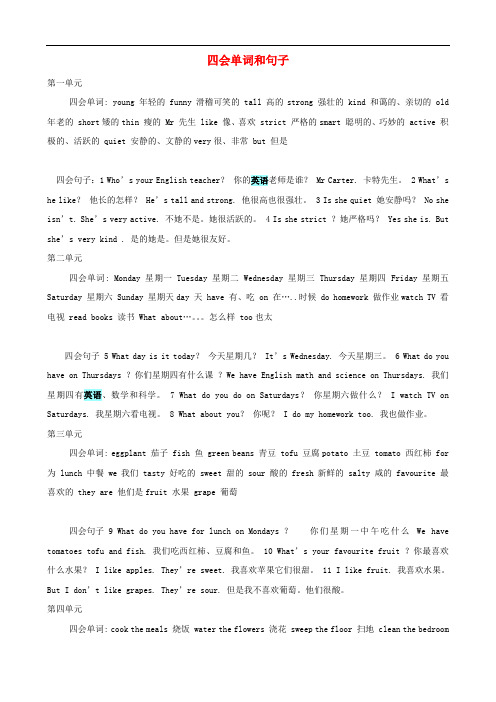
四会单词和句子第一单元四会单词: young 年轻的 funny 滑稽可笑的 tall 高的strong 强壮的 kind 和蔼的、亲切的 old 年老的 short矮的thin 瘦的 Mr 先生 like 像、喜欢 strict 严格的smart 聪明的、巧妙的 active 积极的、活跃的 quiet 安静的、文静的very很、非常 but 但是四会句子:1 Who’s your English teacher?你的英语老师是谁? Mr Carter. 卡特先生。
2 What’s he like?他长的怎样?He’s tall and strong. 他很高也很强壮。
3 Is she quiet 她安静吗? No she isn’t. She’s very active. 不她不是。
她很活跃的。
4 Is she strict ?她严格吗? Yes she is. But she’s very kind . 是的她是。
但是她很友好。
第二单元四会单词: Monday 星期一Tuesday 星期二 Wednesday 星期三 Thursday 星期四 Friday 星期五Saturday 星期六 Sunday 星期天day 天 have 有、吃 on 在…..时候 do homework 做作业watch TV 看电视 read books 读书What about…。
怎么样 too也太四会句子 5 What day is it today?今天星期几?It’s Wednesday. 今天星期三。
6 What do you have on Thursdays ?你们星期四有什么课?We have English math and science on Thursdays. 我们星期四有英语、数学和科学。
7 What do you do on Saturdays?你星期六做什么? I watch TV on Saturdays. 我星期六看电视。
五年级英语下册单词和重点句型

五年级英语下册单词和重点句型一、单词1.animal(动物)- a living creature such as a dog or cat that is not a human being例句:I love animals, especially dogs.2.cloud(云)- a white or grey mass in the sky, made up of very small floating drops of water例句:Look at the clouds in the sky, they are so beautiful.3.continue(继续)- to keep happening, existing, or doing something without stopping例句:The rain continued for several hours.4.exercise(锻炼)- physical activity that you do to make your body strong and healthy例句:I do exercises every morning to keep fit.5.fruit(水果)- something sweet that grows on a tree or bush and contains seeds or a stone covered by skin例句:I like to eat apples, oranges, and other fruits.6.island(岛屿)- a piece of land that is completely surrounded by water例句:We went to a beautiful island for our vacation.7.nature(自然)- everything in the physical world that is not controlled by humans, such as plants, animals, and natural events例句:I love spending time in nature, it helps me relax.8.picnic(野餐)- a meal that you have outside, often with friends, where you take food and drink with you例句:Let's have a picnic in the park this weekend.9.popular(受欢迎的)- liked by many people; frequently chosen or used例句:Harry Potter books are very popular among children.10.subject(科目)- an area of knowledge, especially one that you study at school, college, or university例句:My favorite subjects at school are English and Science.11.vegetable(蔬菜) - a plant or part of a plant that is eaten as food.例句:Eating vegetables is good for your health.12.mountain(山) - a large natural elevation of the earth's surface rising abruptly from the surrounding level; a large hill.例句:The mountains are covered with snow in winter.13.river(河) - a large natural stream of water flowing in a channel to the sea, a lake, or another river.例句:The river flows through the city.14.ocean(海洋) - a very large area of sea.例句:The ocean is full of mysteries.15.star(星星) - a celestial body that shines by its own light or byreflected light.例句:We can see many stars in the sky at night.16.moon(月亮) - the natural satellite of the earth.例句:The moon is full tonight.17.sun(太阳) - the star around which the earth and other planets revolve.例句:The sun is shining brightly.18.flower(花) - the reproductive structure of angiosperms, typically having brightly colored petals and a sweet fragrance.例句:The garden is full of beautiful flowers.19.book(书) - a written or printed work consisting of pages glued or sewn together along one side and bound in covers.例句:I love reading books.20.pen(钢笔) - an instrument for writing or drawing with ink.例句:I use a pen to write my diary.21.pencil(铅笔) - an instrument for writing or drawing made of a slender rod of graphite or a similar substance enclosed in a wooden casing.例句:I use a pencil to sketch.22.ruler(尺子) - an instrument for measuring or drawing straight lines.例句:I need a ruler to draw a straight line.23.eraser(橡皮) - an object used to remove pencil or ink marks from paper.例句:I can't find my eraser.24.backpack(背包) - a bag with shoulder straps, used to carry books andother items.例句:I carry my books in a backpack.25.desk(书桌) - a table, typically with drawers, at which one can read, write, or do other work.例句:My desk is messy.26.chair(椅子) - a seat with a back and legs, for one person.例句:I sit on a chair to study.27.classroom(教室) - a room in a school or college where classes are held.例句:The classroom is clean and tidy.28.teacher(老师) - a person who teaches, especially in a school.例句:My teacher is very kind.29.student(学生) - a person who is studying at a school or college.例句:I am a student.30.homework(家庭作业) - work that is assigned to students to be done outside of class.例句:I have a lot of homework to do.31.test(考试) - an examination of knowledge or skills, typically by means of questions and answers or practical exercises.例句:I am nervous about the test.32.grade(成绩) - a mark or score given for a piece of work or an examination. 例句:I got a good grade on my test.33.library(图书馆) - a building or room containing collections of books, periodicals, and sometimes films and recorded music for use or borrowing bythe public or a particular group.例句:I like to study in the library.34.bookstore(书店) - a shop that sells books.例句:I went to the bookstore to buy a new book.35.movie(电影) - a series of moving images, usually with sound, that tell a story.例句:I watched a movie last night.36.theater(剧院) - a building or outdoor area where plays and other dramatic performances are given.例句:We went to the theater to see a play.37.music(音乐) - an art form consisting of sound and silence, organized in time.例句:I love listening to music.38.instrument(乐器) - an object used to produce musical sounds.例句:He plays many instruments.39.singer(歌手) - a person who sings, especially professionally.例句:The singer has a beautiful voice.40.dance(舞蹈) - an art form consisting of movements of the body, usually in time to music.例句:She loves to dance.41.sport(运动) - an activity involving physical exertion and skill in which an individual or team competes against another or others.例句:I like to play sports.42.football(足球) - a game played by two teams of eleven players each, usinga round ball which players kick up and down the field in an attempt to score goals.例句:I play football with my friends.43.basketball(篮球) - a game played by two teams of five players each, usinga round ball which players try to throw through a hoop mounted on a backboard at each end of the court.例句:He is good at basketball.44.tennis(网球) - a game played by two or four players on a rectangular court, using a racket and a small, hollow rubber ball.例句:I play tennis on weekends.45.swimming(游泳) - the act of moving through water by using the arms and legs.例句:I go swimming every day.46.running(跑步) - the act of moving quickly on foot by alternately taking one foot off the ground and putting it down in front of the other.例句:I like running in the morning.47.cycling(骑自行车) - the act of riding a bicycle.例句:He goes cycling every weekend.48.hiking(徒步旅行) - the activity of going for long walks in the countryside.例句:We went hiking in the mountains.49.camping(露营) - the activity of spending a night or more outdoors in atent or other shelter.例句:I love camping in the summer.50.park(公园) - a public area of land set aside for recreation and enjoyment, usually with trees, grass, and flowers.例句:We went to the park to have a picnic.51.garden(花园) - a piece of land, usually near a house, used for growing flowers, vegetables, or other plants.例句:My grandmother has a beautiful garden.52.tree(树) - a large plant with a trunk, branches, and leaves.例句:There are many trees in the park.53.leaf(树叶) - a flattened structure growing from a stem or branch of a plant.例句:The leaves are turning red in autumn.54.flowerpot(花盆) - a container in which plants are grown.例句:I planted a flower in a flowerpot.55.bird(鸟) - a warm-blooded vertebrate animal that has feathers, wings, anda beak.例句:I saw a beautiful bird in the garden.56.fish(鱼) - a cold-blooded vertebrate animal that lives in water and has gills, fins, and a tail.例句:There are many fish in the river.57.insect(昆虫) - a small animal with six legs and a body divided into three parts.例句:I saw an interesting insect in the garden.58.butterfly(蝴蝶) - a flying insect with large, brightly colored wings.例句:The butterfly is very beautiful.59.bee(蜜蜂) - a flying insect that makes honey and pollinates flowers.例句:Bees are very busy.60.ant(蚂蚁) - a small insect that lives in colonies and is known for its hard work and organization.例句:Ants are very strong.61.house(房子) - a building for human habitation, usually consisting of a roof, walls, and floors.例句:I live in a big house.62.room(房间) - a part of a building enclosed by walls and a ceiling.例句:My room is very clean.63.kitchen(厨房) - a room or area where food is prepared and cooked.例句:My mother is cooking in the kitchen.64.bedroom(卧室) - a room where one sleeps.例句:I am sleeping in my bedroom.65.bathroom(浴室) - a room containing a bath or shower and often a toilet. 例句:I am taking a shower in the bathroom.66.living room(客厅) - a room in a house used for relaxing and entertaining guests.例句:We are watching TV in the living room.67.furniture(家具) - the movable articles that are used to make a room or building suitable for living or working.例句:We bought some new furniture for our house.68.table(桌子) - a piece of furniture with a flat top and one or more legs, used for eating, working, or playing games.例句:There is a vase on the table.69.chair(椅子) - a seat with a back and legs, for one person.例句:I am sitting on a chair.70.sofa(沙发) - a long, upholstered seat with a back and arms, for two or more people.例句:We are sitting on the sofa.71.bed(床) - a piece of furniture for sleeping or resting on.例句:I am lying on my bed.72.cupboard(橱柜) - a piece of furniture with shelves and doors, used for storing dishes, food, or other items.例句:There are many cups in the cupboard.73.drawer(抽屉) - a box-like compartment that slides in and out of a piece of furniture.例句:I keep my socks in a drawer.74.window(窗户) - an opening in a wall or roof to let in light and air.例句:The window is open.75.door(门) - a movable barrier used to close an opening in a wall or fence. 例句:I opened the door.76.floor(地板) - the surface of a room on which one stands or walks.例句:The floor is clean.77.ceiling(天花板) - the upper surface of a room, usually covered with plaster or other material.例句:The ceiling is high.78.wall(墙) - a vertical structure that divides or encloses an area.例句:The wall is painted white.79.color(颜色) - the visual perception of different wavelengths of light.例句:I like blue color.80.red(红色) - a bright color that is associated with heat, energy, and passion.例句:The rose is red.81.blue(蓝色) - a color that is associated with calmness, stability, and trust.例句:The sky is blue.82.green(绿色) - a color that is associated with nature, growth, and freshness.例句:The grass is green.83.yellow(黄色) - a bright color that is associated with sunshine, happiness, and optimism.例句:The sunflower is yellow.84.purple(紫色) - a color that is associated with royalty, luxury, and creativity.例句:The flower is purple.85.orange(橙色) - a bright color that is associated with energy, warmth, and enthusiasm.例句:The sunset is orange.86.white(白色) - a color that is associated with purity, innocence, and simplicity.例句:The snow is white.87.black(黑色) - a color that is associated with mystery, elegance, and power.例句:The cat is black.88.grey(灰色) - a color that is a mixture of black and white, and is associated with neutrality, balance, and stability.例句:The clouds are grey.89.brown(棕色) - a color that is associated with earth, stability, and reliability.例句:The bear is brown.90.pink(粉色) - a light red color that is associated with femininity, sweetness, and romance.例句:The dress is pink.91.clothes(衣服) - items of clothing.例句:I need to buy some new clothes.92.shirt(衬衫) - a garment for the upper body, typically with a collar, sleeves, and buttons down the front.例句:He is wearing a white shirt.93.pants(裤子) - an outer garment covering the body from the waist to the ankles.例句:I am wearing blue pants.94.skirt(裙子) - a garment for women or girls, hanging from the waist and usually reaching to the knees or ankles.例句:She is wearing a beautiful skirt.95.dress(连衣裙) - a one-piece garment for women or girls, typically with a skirt and bodice.例句:I bought a new dress.96.shoe(鞋子) - an outer covering for the foot, typically made of leather or other material.例句:I need to buy new shoes.97.sock(袜子) - a garment for the foot and lower leg, typically made of cotton or wool.例句:I am wearing white socks.98.hat(帽子) - a head covering.例句:He is wearing a black hat.99.gloves(手套) - a covering for the hand, typically with separate parts for each finger.例句:I am wearing gloves to keep my hands warm.100.coat(外套) - an outer garment, typically with sleeves and a fastening down the front.例句:I am wearing a warm coat.二、重点句型1. What's your favorite...?(你最喜欢的是什么…?)例句:What's your favorite color? - My favorite color is blue.这个句型用来询问对方最喜欢的事物,比如颜色、动物、食物等等。
人教版英语小学五年级下册【单词、短语、句型】期末重点知识归纳

twentieth-second(22nd) 第 二 十 二 twentieth-third(23rd) 第 二 十 三
thirtieth(30th) 第三十
special 特殊的 二、用序数词表示具体的日期
fool 傻瓜
在英语中, “几月几日 ”可以先说 “月 ”,再说 “日 ”,其中 “日 ”要用序数
March 三月
April 四月
May 五月
3
July 七月 August 八月 一月 December 十二月
September 九月 October 十月
November 十
注意 :
1、月份的首字母一定要大写。
w W w.x K b 1.c o M
2、 May 没有缩写形式, September 的缩写形式是 “ Sept其他”月,份单词的
April Fool ’Dasy 愚人节( 4.1) May Day 劳动节( 5.1)
Mother ’s
Day 母亲节( 2015.5.10)
Children Da’y s儿童节( 6.1) Father D’ays父亲节( 8.8)
Teacher ’
Day 教师节( 9.10)
National Day 国庆节 (10.1) 秋节(农历八月十五)
是的第六单元重点词汇doingmorningexercises正在做早操havingclass正在上eatinglunch正在吃午饭readingbook正在看书listeningmusic正在听音乐keep保持某种状态keeptoright靠右keepyourdeskclean保持你的课桌干净talkquietly小声讲话turn顺序taketurns按顺序来其他动词短语的ing形式gettingup正在起床watchigtv正在看电视playingsports正在进行体育运动playingpiano正在弹钢琴sweepingthefloor正在扫地wateringflowers正在浇花climbingmountains正在爬山flyingkites正在放风筝三重点句型1如何问答多个人或动物正在做什么句型结构
人教版五年级英语下册全册知识点总结
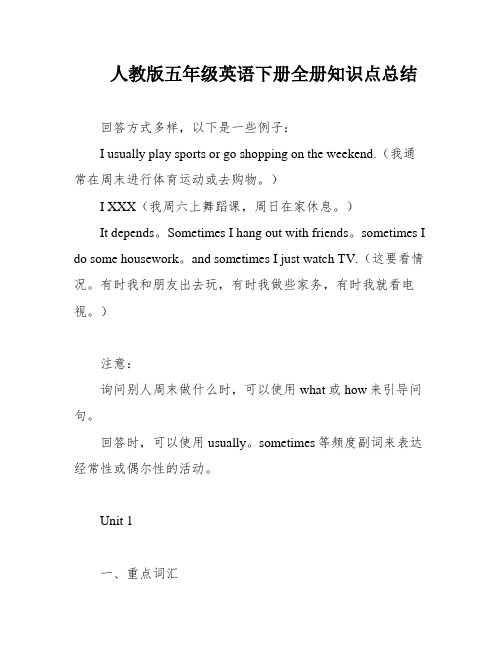
人教版五年级英语下册全册知识点总结回答方式多样,以下是一些例子:I usually play sports or go shopping on the weekend.(我通常在周末进行体育运动或去购物。
)I XXX(我周六上舞蹈课,周日在家休息。
)It depends。
Sometimes I hang out with friends。
sometimes I do some housework。
and sometimes I just watch TV.(这要看情况。
有时我和朋友出去玩,有时我做些家务,有时我就看电视。
)注意:询问别人周末做什么时,可以使用what或how来引导问句。
回答时,可以使用usually。
sometimes等频度副词来表达经常性或偶尔性的活动。
Unit 1一、重点词汇吃早餐:eat breakfast 上······课:have。
class进行体育运动:play sports做早操:do morning exercises 打扫我的房间:clean my room 去购物:go shopping舞蹈:dancing上午:a.m.通常地:usually二、其他日常活动起床:get up上床睡觉:go to bed活动,运动:exercise吃晚饭:eat XXX散步:go for a walk研究,上(课):XXX上舞蹈课:take a dancing class下午:p.m.吃午饭:eat XXX洗脸:XXX洗我的衣服:XXX看电视:watch TV打乒乓球:play ping-pong弹琵琶:play the pipa去游泳:go swimming去跑步:go running做作业:do homework练武术:do XXX踢足球:play football打篮球:play basketball三、语音cl→ [cl]:clean。
5年级下册单词表人教版

5年级下册单词表人教版Unit 1.- eat breakfast [iːt ˈbrekfəst] (动词短语):吃早饭。
- have…class [hæv klɑːs] (动词短语):上……课。
- play sports [pleɪ spɔːts] (动词短语):进行体育运动。
- exercise [ˈeksəsaɪz] (v. 锻炼;n. 活动;练习):既可以作动词也可作名词,例如:We exercise every day.(作动词);Doing morning exercises is good for us.(作名词)- do morning exercises [duːˈmɔːnɪŋˈeksəsaɪz] (动词短语):做早操。
- eat dinner [iːt ˈdɪnə(r)] (动词短语):吃晚饭。
- clean my room [kliːn maɪ ruːm] (动词短语):打扫我的房间。
- go for a walk [ɡəʊ fɔː(r) ə wɔːk] (动词短语):散步。
- go shopping [ɡəʊˈʃɒpɪŋ] (动词短语):去买东西;购物。
- take [teɪk] (v. 拿;取;学习;花费):例如:Take this book.(拿);I take English lessons.(学习);It takes me two hours to finish my homework.(花费)- take a dancing class [teɪk əˈdɑːnsɪŋ klɑːs] (动词短语):上舞蹈课。
Unit 2.- spring [sprɪŋ] (n. 春天)- summer [ˈsʌmə(r)] (n. 夏天)- autumn [ˈɔːtəm] (n. 秋天;秋季,也可写作fall)- winter [ˈwɪntə(r)] (n. 冬天)- season [ˈsiːzn] (n. 季节)- picnic [ˈpɪknɪk] (n. 野餐):We have a picnic in the park.- go on a picnic [ɡəʊɒn əˈpɪknɪk] (动词短语):去野餐。
人教精通版英语五年级下册课后句型+单词归类
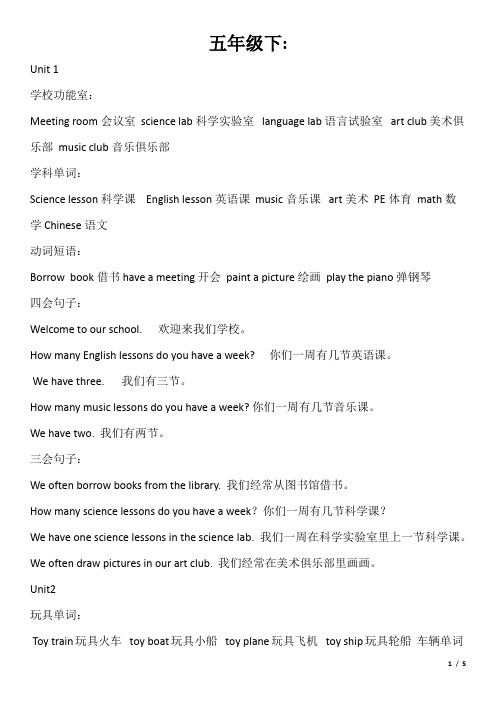
五年级下:Unit 1学校功能室:Meeting room会议室 science lab科学实验室 language lab 语言试验室 art club 美术俱乐部 music club音乐俱乐部学科单词:Science lesson 科学课 English lesson英语课 music音乐课 art美术 PE体育 math数学 Chinese语文动词短语:Borrow book借书 have a meeting 开会 paint a picture 绘画 play the piano 弹钢琴四会句子:Welcome to our school. 欢迎来我们学校。
How many English lessons do you have a week? 你们一周有几节英语课。
We have three. 我们有三节。
How many music lessons do you have a week? 你们一周有几节音乐课。
We have two. 我们有两节。
三会句子:We often borrow books from the library. 我们经常从图书馆借书。
How many science lessons do you have a week?你们一周有几节科学课?We have one science lessons in the science lab. 我们一周在科学实验室里上一节科学课。
We often draw pictures in our art club. 我们经常在美术俱乐部里画画。
Unit2玩具单词:Toy train玩具火车 toy boat玩具小船 toy plane玩具飞机 toy ship玩具轮船车辆单词motorbike摩托车 jeep吉普车 coach长途旅游车 bike自行车 car小汽车 bus公交车 taxi出租车衣物单词:Trousers裤子 short pants 短裤 coat外套 clothes衣服三会句子:How much is it? 多少钱。
人教版英语五年级下册知识点总结

人教版英语五年级下册知识点总结一、词汇核心词汇学校生活:classroom, library, playground, office, restroom, schedule, lesson, homework, break, lunch家庭成员:family, father, mother, brother, sister, uncle, aunt, cousin日常活动:get up, go to bed, wash face, brush teeth, eat breakfast, do homework, watch TV, play computer games 食物与饮料:hamburger, hot dog, sandwich, pizza, cake, cookie, milk, juice, water拓展词汇学科名称:math, science, Chinese, English, PE, art, music 颜色与衣物:red, blue, yellow, green, white, black, shirt, pants, shoes, hat, socks动物与植物:cat, dog, fish, bird, rabbit, flower, tree, grass, leaf节假日与活动:birthday, Christmas, Spring Festival, summer vacation, winter vacation, party, picnic二、语法现在进行时表达正在进行的动作或状态。
be动词(am/is/are)+动词-ing形式。
例句:What are you doing? I am reading a book. They are playing football.一般现在时表达经常性的行为或状态。
主语为第三人称单数时,动词形式要发生改变。
例句:She always washes her hands before meals. He often watches TV in the evening.一般过去时表达过去某个时间发生的动作或状态。
- 1、下载文档前请自行甄别文档内容的完整性,平台不提供额外的编辑、内容补充、找答案等附加服务。
- 2、"仅部分预览"的文档,不可在线预览部分如存在完整性等问题,可反馈申请退款(可完整预览的文档不适用该条件!)。
- 3、如文档侵犯您的权益,请联系客服反馈,我们会尽快为您处理(人工客服工作时间:9:00-18:30)。
人教版五年级下册单词表和常用表达法Unit1
1.When do you get up ?
你什么时候起床?
2.I often get up at 7o’clock. 我经常7点起床。
3.What do you usually do on the weekend? 你周末通常做什么?
4.I usually watch TVand play ping-pong. 我通常会看电视和打乒乓球。
eat breakfast 吃早饭
have … class上……课
play sports 进行体育运动exercise 活动;运动
do morning exercises 早锻炼eat dinner 吃晚饭
clean my room 打扫我的房间
go for a walk 散步
go shopping 去买东西;购物take 学习;上(课)
take a dancing class 上舞蹈课when 什么时候;何时
after 在(时间)后
start 开始
usually 通常地;惯常地
Spain西班牙
late晚;迟a.m. 午前;上午
p.m. 午后;下午
why 为什么
shop 去买东西;购物work 工作
last 上一个的;刚过去的sound 听起来好像
also 还;也
busy忙的
need 需要
play 戏剧;剧本
letter 信
live 居住
island 岛
always 总是,一直
cave 山洞;洞穴
win 获胜
Unit2
1.Which season do you like best? 你最喜欢哪一个季节?
2.Autumn./I like autumn best.
秋天。
/我最喜欢秋天。
3.What do you often do in summer? 你在夏天经常做什么?
4.I often go swimming.
我经常去游泳
spring 春天
summer 夏天
autumn 秋天
winter 冬天
season 季节
picnic 野餐
go on a picnic 去野餐pick 摘;采集
pick apples 摘苹果snowman 雪人
make a snowman 堆雪人which 哪一个
best 最好地
snow 雪
good job做得好
because 因为
vacation 假期
all 全,完全
pink 粉色;粉色的
lovely 可爱的;美丽的
leaf 叶子
fall 落下;【美】秋天
paint 用颜料绘画,日常安排
Unit3
1.When is Tree Planting Day? 什么时候是植树节?
2.It’s in March. 它在三月。
January 一月February 二月March 三月
April 四月
May 五月
June 六月
July 七月
August 八月September 九月October 十月November 十一月December 十二月plant 种植contest 比赛;竞赛year 年few 一些
a few 一些
thing 事情
meet 集会;开会sports meet运动会Easter 复活节
trip 旅行
national 国家的National Day 国庆日American 美国的Thanksgiving 感恩节Christmas 圣诞节
3.When is the school trip this year? 今年的学校旅行是什么时候?
4.It’s in October.
它在十月。
Unit4
1.There are some special days in April. 四月份有一些特别的日子。
2.When isApril Fool’s Day?
什么时候是愚人节?
3.It’s on April 1st. 在四月一日。
4.When is your birthday?
什么时候是你的生日。
5.My birthday is on April 4th. 我的生日在四月四日。
first (1st)第一的
second (2nd)第二的
third (3rd)第三的
fourth (4th)第四的
fifth (5th)第五的
twelfth (12th)第十二的twentieth (20th)第二十的twenty-first (21st)第二十一的twenty-third (23rd)第二十三的thirtieth (30th)第三十的fool 蠢人;傻瓜
special 特别的;特殊的
kitten 小猫
diary 日记
still 仍然;依旧;还是
noise 声音;响声(尤指)噪音fur (某些动物的)浓密的软毛open 开着的
walk 行走
unit5
mine 我的
yours 你(们)的
his 他的
hers 她的
theirs 他们的;她们的;它们的
ours 我们的
climbing (climb的-ing形式)(正在)攀登;攀爬eating(eat的-ing形式)(正在)吃
playing(play的-ing形式)(正在)玩耍
jumping(jump的-ing形式)(正在)跳
drinking(drink的-ing形式)(正在)喝(水)sleeping(sleep的-ing形式)(正在)睡觉
each 每一;各个
other 其他的
1.Whose dog is it? 它是谁的小狗?
2.It’s mine.
它是我的。
3.The yellow picture is mine. 这个黄色的图画是我的。
Unit6
doing morning exercises(正在)早锻炼
having … class(正在)上课eating lunch(正在)吃午饭reading a book(正在)看书listening to music(正在)听音乐
keep保持某种状态
keep to the right靠右
keep your desk clean 保持你的课桌整洁
talk quietly 小声讲话its它的;他的(指事物、动物或幼儿)
show 引导;指引
anything 任何事物
else 另外;其他
exhibition 展览
say 说;讲
have a look 看一看
sushi 寿司
teach 教
Canadian 加拿大的
Spanish 西班牙的
1.Look at the pandas.
看看这些熊猫。
2.What are they doing ?
他们正在干什么?
3.They‘re eating lunch.
他们正在吃午饭。
4.I can show you the English books. 我可以给你指出英语书(在哪里)。
